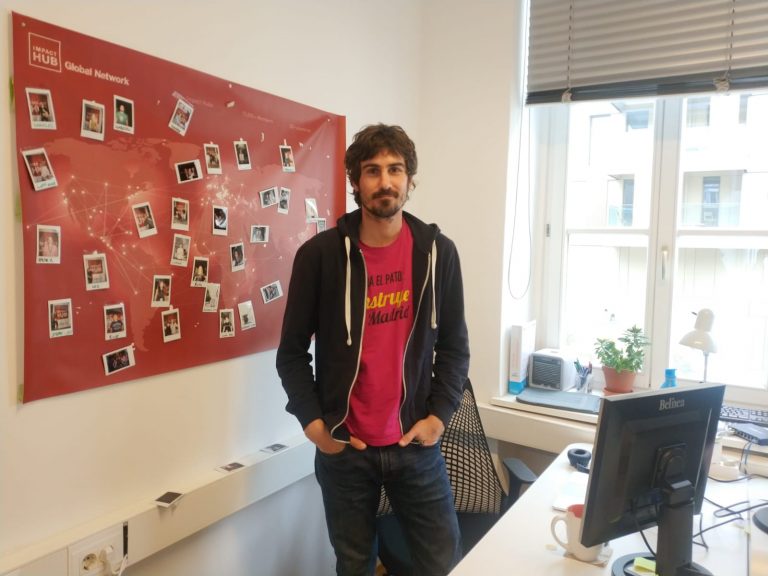
A few words from Mikel Oleaga
Could you introduce yourself briefly? Tell us a few things about your background, studies, and general interests.
I’m Mikel Oleaga, from Madrid, Spain. I have Bachelor’s degrees in Law and in Business Administration and a master’s in Public Policy. In 2011 I joined the management team of one of the first co-working spaces in Spain where I worked for over eight years. During those years held several roles, including community manager, and specialized in social innovation and social entrepreneurship project management. I have also launched a consultancy firm on social entrepreneurship specialized in youth and I have worked in the third sector in the anti-corruption field. Throughout my life, I have been involved in several activist movements and I am a firm believer in the collaboration of the public, private and civic sectors.
How was your moving to your new home? How are things going for you in your new place?
I think I have been lucky. I already had some contacts in Vienna and fortunately, unlike many other European cities, it is not so hard and expensive to find a house here. Vienna is also a beautiful city and offers a very good quality of life. Now my goal is to learn German, not a minor challenge. Regarding the life of an ESR, it is very different from my past experiences. You rely very much on yourself and you need a lot of self-discipline to achieve progress. At the same time, it is very stimulant intellectually and gives you a lot of flexibility.
You are preparing for your Work Package meeting, how is your work going?
These past months I have been working on my literature research, focusing on the available literature CWS and related fields and preparing a first research proposal draft. The more you read the more ideas you get, so the challenge has been to find a concrete focus that is viable in the time of the project. At the same time, I have been researching the potential options and approaches to conduct the empirical phase of the research given the geographical scope and the partners involved in the consortium.
Could you share with us some key insights/ “aha moments” from your work so far?
In the first place, I was surprised by how little research exists on the topic. The focus of academic research on this topic is very recent and the literature existing is very limited. This is challenging since there are not many examples of researches conducted in these kinds of contexts and the inspiration in the already existing literature on CWS requires a thorough adaptation. At the same time, it allows a great deal of space for research proposals that will fill knowledge gaps. At the same time, it has been interesting to realize that CWS have been already at the center or represented key aspects of many public policy interventions in the EU.
What do you expect from the WP meeting?
First of all, I would like to get validated my initial research proposal and approach by the WP lead supervisor and by my peers in this WP. I am looking forward to sharing it with them and receiving feedback that can improve the proposal. In the second place, I would like to know better the research proposal and approaches of my peers to see how our proposals complement each other and what spaces of collaboration we can find. I think that this collaboration and coordination, particularly in the empirical phase of our researches, can be very beneficial to all of us.
Share Mikel’s journey